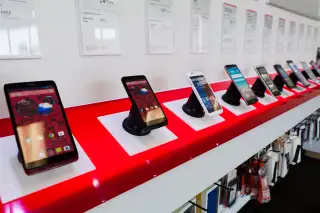Cell Phone Contracts are Dead

Cell phones may have only hit the mainstream in the late ’90s, but it seems like the two-year contract has been around forever. In fact, “that’s just the way it is” has been the standard response to customer complaints for years, as if the two-year plan were an unassailable pillar of the Constitution, natural law, or gravity.
But that’s all over now. T-Mobile phased out its two-year contracts a few years ago. AT&T followed suit on June 1. Then last week, Verizon, the nation’s largest wireless carrier, announced the end of its mobile contracts, electing to shift to a month-to-month system, with tiered pricing based on the amount of data customer uses.
This shift has some interesting implications for the future of phones. Here's what you can expect from the post-contract landscape.
1. Get ready to pay full price for your phone
Month-to-month plans aren’t new, but relatively few people used them because two-year contracts had an attractive advantage: The carrier covered a large portion of the phone’s cost. With the list price of an iPhone running $649 these days, those $350 to $400 carrier subsidies convinced a lot of people to sign on the dotted line. Now that carriers like Verizon won’t get a two-year brand loyalty promise up front, the consumer is on the hook for every dollar of that new phone. That said, most carriers will allow you to pay for your phone over time, up to two years.
2. As a result, budget phones will explode in popularity
It’s easy to forget that an iPhone’s list price is $649 if you’ve been paying less than half that for the better part of a decade. Waking up to that nightmarish number will direct many consumers towards budget options, which are getting better and better as phone technology levels out. Gizmodo called the $299 OnePlus One phone an “unbelievably fantastic smartphone.” The Verge said it was better than Google’s Nexus 5 and rated it an 8 out of 10. Good and cheap will certainly steal users from Apple and Samsung.
3. Android is about to steal some serious market share—unless Apple reacts
If budget phones take off, it’s going to be a victory for Google's Android operating system, since every budget phone runs it. However, this could be the push Apple needs to finally create a more affordable iPhone.
Read next: 5 Reasons You Should Be Paying Less for Your Cellphone Plan
4. You’ll probably see fewer naked phones
Having the full iPhone experience is far from a risk-free proposition—one false move can easily put a spiderweb crank across the screen. With upgrades and subsidized phones out of the picture, there’s a big incentive to protect that phone and squeeze more than just two years out of it.
5. Lines at the Apple store will get longer for product debuts
Breaking from the biennial new phone calendar won’t just keep people on their old phones longer; it’ll also allow people to switch up their device at any time they feel like it, since upgrades won’t exist. With no incentive to wait, the lines at the Apple stores might get considerably longer on launch days.
6. It’s easier to try a new carrier
With no contracts to lock you in, switching from one carrier to another has never been easier. If a different carrier has a reputation for better reception in your area, you can give it a shot and switch back if it doesn’t work out. Of course, “easier” may still mean hours of customer service headaches and initiation fees.
7. You can skate across a carrier’s plans as your habits change
In a two-year contract, it’s not unheard of for people to add more data if they butt up against their limit or incur an overage fee (Verizon’s is $15 per GB, for example). With Verizon’s new system, you can easily add or subtract from your plan’s data, depending on your usage. Know you’re going to be on Wi-Fi for most of December? You might get away with Verizon’s “Small” 1 GB/mo plan. On the road for three weeks? Grab a “Large” 6 GB/mo plan.
8. All this could change again very soon
The death of the two-year contract is distinct reminder that all of this is still very new and subject to change—and quickly. When Google Fi’s affordable and no-nonsense mobile plan (a line is $20 monthly and data is $10 per GB on top) stops being invite-only and limited to the Nexus phones, the main carriers are going to have to act quickly to keep up.
Here's how to find the perfect cellphone plan for you